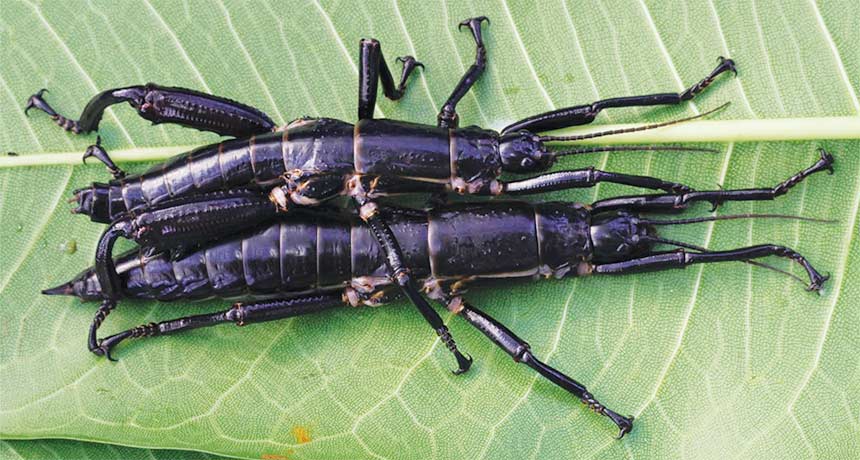The Lord Howe stick insect is officially back from the dead

It’s a rare triumph when a species comes back from the dead. A new genetic analysis has officially established what many entomologists and conservation biologists hoped was true: The Lord Howe stick insect (Dryococelus australis) lives.
Nicknamed “tree lobsters,” the dark-brown crawlers are nocturnal, flightless creatures that can grow up to 15 centimeters long. They feed on tea trees, which are dense shrubs found on Lord Howe Island in New South Wales, Australia. Black rats, introduced to the island in the 1920s, wiped out the walking sticks. Or so researchers thought.
In 2001, scientists climbing Ball’s Pyramid, a treacherous rocky outcrop southeast of Lord Howe Island, discovered three stick insects feeding on a lone bush. The following year, researchers spotted 24 more. The insects looked eerily similar to the Lord Howe insects, but some physical differences between the new finds and museum specimens called for genetic testing to see if the two were the same.
Now, a comparison of the DNA of the Ball’s Pyramid stick insects with that of the museum specimens from Lord Howe suggests that the two are the same species. Though the museum specimens have a flatter body, larger spines on their legs and a lighter brown coloring, DNA found within the mitochondria of the two populations is more than 99 percent identical, the researchers report October 23 in Current Biology.
This is good news for conservation biologists intent on reintroducing the long-lost insect to Lord Howe Island. “Now that we know that it is the original stick insect, there is a much stronger case” for releasing it into the original habitat, says evolutionary biologist and study coauthor Sasha Mikheyev of the Okinawa Institute of Science and Technology Graduate University in Japan.
The Melbourne Zoo has been breeding stick insects taken from Ball’s Pyramid since 2003, with the goal of reintroducing them to Lord Howe. As of November 2, about 14,500 insects — spanning 14 generations — have been bred at the zoo.
Before sending the critters to their original homeland, however, the Lord Howe Island Board plans to eradicate the black rats and a second nonnative rodent in 2018. Without these predators, the tree lobsters have a better chance of reestablishing, Mikheyev says. “The story of this insect really highlights the fragility of island ecosystems,” he adds. “With this species, we have a second chance.”